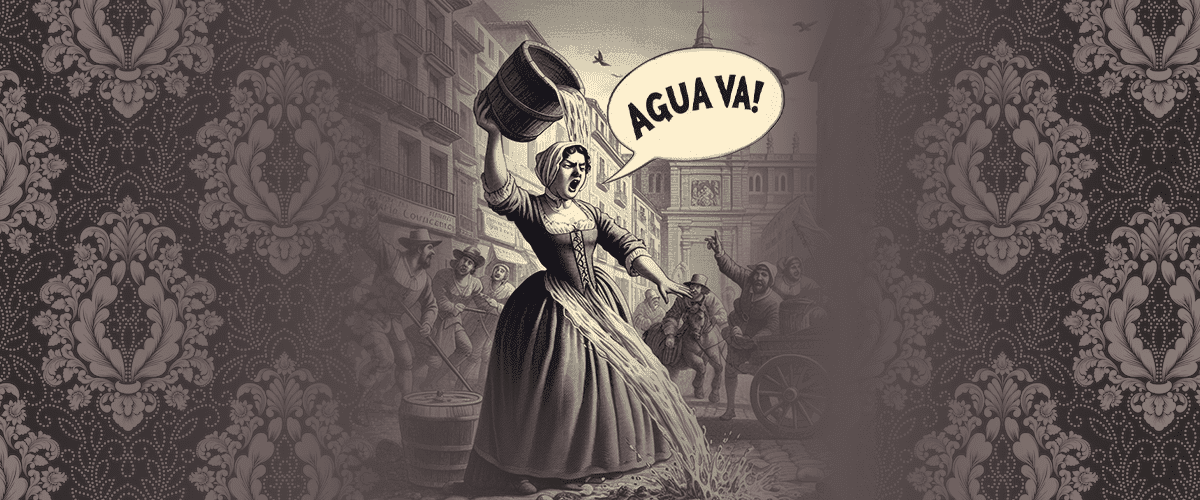El popular ¡Agua va!
Be Tourist guide It immerses me in a new world (contradictory, if we take into account that the tour takes place between the 9th and 19th centuries), which daily gives me unexpected experiences, beautiful people and a lot of learning.
And I'm not just referring to dates, places and anecdotes, but to the way in which each of these stories allows me to understand what surrounds me... and I'm not referring to Madrid and its inhabitants, but to the world in general and to human beings in particular.
One of the stories we tell and that is most funny to foreign tourists is called “WATER GOES!”, an expression used in the Spain of yesteryear, to warn unsuspecting passers-by of the imminent foul-smelling rain that could bathe them.
Let me explain:
In 1759 he began to reign in Spain Carlos III, better known as “The King Mayor” or “The best mayor of Madrid“This gentleman who was first King of Nápoles and of Sicilia, had to abdicate in those lands to come to direct the destinies of the Motherland After the death of his brother, he never imagined that his arrival in the capital would bring about a great revolution in his life, in that of his team and in that of his new constituents.
The Carlos III He came from Italy accompanied by his foreign ministerial train, thinking that the change of “branch” would not make much difference to him, but what was his surprise (and surely a lot of shame) when he entered his hometown and found an old-fashioned, dirty, smelly capital of the Kingdom with pigs running wild, among the rest of the passers-by… it is also likely that the new king had not yet recovered from his shock, nor imagined that the most scatological thing was yet to come, when he heard the first “WATER GOES!” (shouted like that), a custom that consisted of doing one’s physiological needs in a bucket, pail or basin and throwing it out the window, accompanied by the well-known “alerting" phrase.

It was this, among other Madrid habits, that made the monarch take immediate measures, which over time would convert the city of Bear and the Strawberry Tree in one of the most important capitals in the world: health regulations, sewage system, garbage collection system, public lighting system, postal system, the national lottery, the first private bank, Cibeles fountain, Neptune fountain,The Gate of Alcalá and the building of the Prado Museum, including, among others, the prohibition of animals that like to roll in their own excrement from being let loose… but the results of these measures were only appreciated much later.
At that time, the people of Madrid resisted the rules and changes imposed by the monarch so much that Carlos III He concluded, out loud, “My subjects are like little children… they cry when they are washed!”.
When I started studying the script of the tour To start working, this topic caught my attention so much that I began to do my own research to better understand this circumstance, and with each new piece of information I discovered, I realized how identical those reactions were to those we continue to have today, despite so much literature, technology and toilets.
There is nothing more “democratic” (due to the participation of all, regardless of their social, religious, political or gender status and the inalienable right to cling to what is known) than RESISTANCE TO CHANGE; it may be easier for some than for others, but the reality is that there is nothing that generates more stress and confusion and that is so common in human beings, than suffering when we have to leave our "Comfort zone“…even if this is extremely uncomfortable!
Hundreds of websites, seminars, workshops and paid or free advice, tell us about the importance of getting out of the Comfort zone to be able to evolveThe problem is that this is correct in theory, but in practice it has a lot of complications, because of how deeply rooted the habit is in us, because of the natural tendency to fear the unknown and because of the ineffectiveness of its implementation when the option comes from third parties, because the experience of others is just as inefficient when the need to change does not come from within us!
To this we can add, as an interesting fact, that resistance to change is one of those things that we demand from others, ignoring our own efforts to achieve it and Carlos III was a great example of this:
A man who wanted to change the behaviour of the people of Madrid, suspending ancient and deep-rooted celebrations, who tried to cut men's clothing, who came to change ideology, institutions, society and economy, was the one who for his own life, demanded the same cup to drink chocolate, the same dishes and cutlery to eat with and in 30 years his tailor only made him 10 suits without ever changing the size or style.
Este hombre rutinario, austero, devoto, obediente, con hábitos aburridos y que a los 44 años por viudez, decidió no conocer más mujer (¡ni sexo!), fue el mismo que mutó en torbellino para menear la capital y ponerla patas arriba, aunque fuera con buenas intenciones y mejores resultados… el hombre exigió a los demás, lo que no fue capaz de establecer en su propia vida: consistency in modeling and the ability to adapt to novelty.
It is not necessary to delve into the history of Spain to know the monumental rejection felt by the king's subjects, expressed in the famous "Esquilache riot”, a popular revolt that began when the Minister of Finance, the Marquis of Esquilache, for security reasons prohibited the use of long capes and wide-brimmed hats; one does not have to delve into this history to imagine that behind that absurd claim, there was weariness with so much change and modernization, along with neglect of the real needs of the people of Madrid.

In conclusion, this reflection, based on history, is becoming more extensive:
Absolutely all human beings change, because "the only constant is change«, pero sólo lo hacemos cuando en nosotros se crea la necesidad de hacerlo… nadie cambia porque otro se lo pide y si lo hace, no es sostenido en el tiempo!
Still, we have to say: Thank you Charles III! Because although the change was "forced", that was the beginning of the modernization and splendor of our wonderful city!


